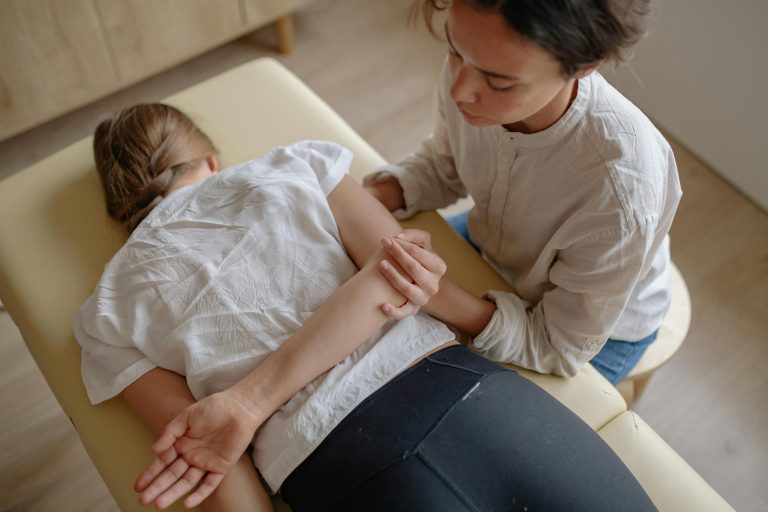- Dealing with anxiety can be challenging, but it is possible to overcome it.
- Relaxation techniques such as deep breathing, meditation, and yoga can help reduce anxiety.
- Challenging negative thoughts and establishing healthy habits are also helpful in managing anxiety.
- Seeking support from loved ones and consulting with a psychiatrist may be necessary for some individuals.
- Developing effective strategies to manage anxiety and improve overall well-being with patience and effort is possible.
Dealing with anxiety can be challenging and overwhelming, but it is possible to overcome it. Anxiety affects people differently, causing excessive worry, fear, and physical symptoms. This guide will provide five tips to help you deal with and overcome anxiety, allowing you to live a more peaceful and fulfilling life.
1. Practice Relaxation Techniques
One effective way to manage and reduce anxiety is by practicing relaxation techniques. Deep breathing exercises, such as diaphragmatic or box breathing, can help activate the body’s relaxation response and calm your mind. Inhale deeply and slowly through your nose, allowing the air to fill your lungs. Hold for a few moments, savoring the tranquility within, and then release the breath slowly, letting go of any tension or worries. Repeat this process several times until you feel a sense of relaxation.
Here are the types of relaxation techniques that you can do:
Mindful Breathing
Mindful breathing is a form of meditation that involves focusing on and observing your breath without judgment. This technique can be done anywhere, anytime, and only takes a few minutes to complete. Start by sitting comfortably with your back straight, close your eyes, and take deep breaths through your nose and out through your mouth. As you breathe, pay attention to the sensation of air passing through your nostrils, filling your lungs, and leaving your body. If your mind wanders, gently bring it back to focus on your breath. This practice can help reduce anxiety and promote a sense of calm.
Progressive Muscle Relaxation
Progressive muscle relaxation entails the deliberate tensing and subsequent relaxation of various muscle groups. This technique can be particularly helpful for people who experience physical anxiety symptoms, such as tension headaches or muscle tightness. Start by lying down or sitting comfortably and tensing one muscle group at a time for 5-10 seconds before releasing the tension. You can start with your hands and feet and work up to your neck and shoulders. This exercise can be repeated as often as needed.
Visualization
Visualization is a relaxation technique that creates a mental image of a peaceful, calming place or experience. Focusing on this positive imagery can help reduce stress and anxiety levels. Find a quiet space where you won’t be interrupted, and close your eyes. Imagine yourself in a peaceful location, such as a beach or a forest, and use all of your senses to immerse yourself in the experience fully. You can also visualize yourself successfully managing a challenging situation or achieving a goal. This technique can help you feel more relaxed and confident.
Mindful Movement
Mindful movement practices, such as yoga, tai chi, or qigong, combine physical movement with mindful breathing and relaxation techniques. These activities can help reduce stress and promote a sense of overall well-being. These slow and intentional movements encourage you to focus on your body and connect with your breath. They also provide an outlet for releasing tension and negative emotions. Consider trying different mindful movement practices to find one that resonates with you. Regular practice can help improve your physical and mental health.
2. Challenge Negative Thoughts

Anxiety often stems from negative thoughts and irrational fears. To overcome anxiety, it’s important to challenge and reframe these thoughts. Start by identifying the negative thoughts that contribute to your anxiety. Ask yourself if there is evidence to support these thoughts or if they are based on assumptions or past experiences.
Once you have identified the negative thoughts, practice replacing them with more realistic and positive ones. For example, if you constantly worry about what others think of you, remind yourself that you cannot control other people’s opinions and that you are worthy of love and acceptance just as you are. Write down these positive affirmations and repeat them to yourself regularly.
3. Establish Healthy Lifestyle Habits
Maintaining a healthy lifestyle can significantly impact your anxiety levels. Prioritize regular exercise, as physical activity releases endorphins that promote feelings of well-being and reduce stress. Find an exercise routine you enjoy, whether walking, practicing yoga, or participating in team sports.
In addition to exercise, focus on eating a balanced diet with plenty of fruits, veggies, whole grains, and lean proteins. Avoid excessive consumption of both caffeine and sugar, as they can increase anxiety symptoms. Take care of your body by getting enough sleep each night, aiming for 7-9 hours of quality rest. Adequate sleep is essential for managing stress and anxiety.
4. Seek Support from Loved Ones

Having a strong support system is crucial when dealing with anxiety. Contact trusted friends, family members, or a therapist and share your feelings and concerns. Simply talking about your anxiety can provide relief and help you gain perspective. Surround yourself with supportive and understanding individuals who can offer empathy and encouragement.
Consider joining support groups or online communities to connect with others experiencing similar struggles. Sharing your experiences with people who truly understand can be comforting and provide a sense of belonging. Remember, you don’t have to face anxiety alone — seeking support is a sign of strength.
5. Consult with a Psychiatrist for Anxiety
If your anxiety persists and significantly impacts your daily life, it may be beneficial to consult a reputable psychiatrist for anxiety. A psychiatrist can provide a comprehensive evaluation, diagnose underlying conditions, and prescribe appropriate medication. They can also recommend specific therapeutic interventions or refer you to a therapist who can help you develop coping strategies and techniques to manage anxiety.
A psychiatrist can work with you to create an individualized treatment plan that addresses your unique needs. Through therapy, medication, or a combination of both, they can guide you toward overcoming anxiety and regaining control over your life. Remember, seeking professional help is a valuable step towards healing and finding long-term relief from anxiety.
Closing Thoughts
Dealing with and overcoming anxiety requires patience, self-care, and support. Practice relaxation techniques, challenge negative thoughts, establish healthy lifestyle habits, seek support from loved ones, and consult a psychiatrist for anxiety if needed. With time and effort, you can develop effective strategies to manage anxiety and lead a more balanced and fulfilling life.






